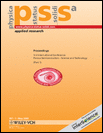Thermo-optic properties of oxidised porous silicon impregnated with index-matching liquids for active optical components
Abstract
Oxidised porous layers (OPS) were impregnated with index-matching liquids with high thermo-optical coefficient. In this paper, we will present some results on the evolution of the refractive index of impregnated OPS, as a function of the temperature. Refractive index linearly varies with temperature. The thermo-optical coefficients of OPS/liquid composite material have been measured. They directly depend on the OPS porosity. We have shown that the experimental results are in agreement with the temperature variations of the refractive index calculated using the effective medium Bruggeman model. The existence of a switching temperature Ts in impregnated two-layer plane waveguides has been demonstrated and the possibility for obtaining thermo-optical switches is discussed.




